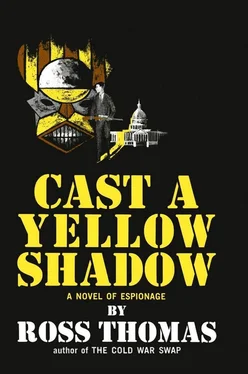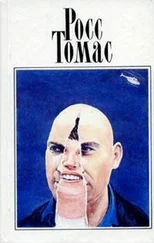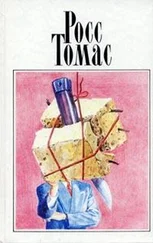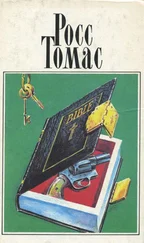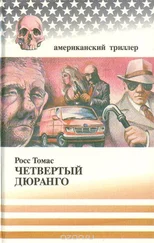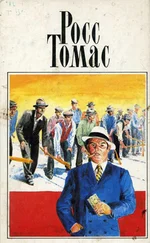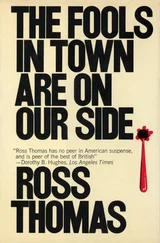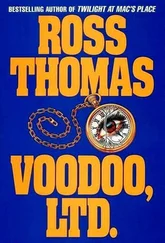“Sure,” he said, and smiled again. “Let’s go.”
We left the four-story house and walked towards the car.
“We didn’t seem to do too well playing the heavies,” I said.
“It was a draw,” Padillo said. “Although they had better lines.”
I made a U-turn on Massachusetts and started back towards downtown. I drove quickly, darting through traffic, and taking a couple of chances on two women drivers who thought that twenty miles an hour was reasonable haste. Padillo turned around and looked out the rear window.
“The green Chevrolet?” he asked.
“Uh-huh.”
“A girl’s driving.”
“She was parked up the street from the trade mission.”
“Don’t lose her,” Padillo said.
“I just wanted to make sure that she knew who we were.”
“Let’s talk to her.”
“Where?”
“You have any ideas?”
I thought a moment. “Rock Creek Park. The trees are just turning.”
“It should be pleasant.”
I turned right at Waterside Drive and the green Chevrolet followed. I drove through Rock Creek Park until I came to the first spot that had picnic tables, shifted down into second, and turned in. The Chevrolet shot past, stopped, then backed up. Padillo and I got out of the car. The Chevrolet pulled into the parking place. The girl behind the wheel cut the engine and sat in the car looking at us. Then she opened the door and got out.
She was a brown-eyed blonde and her hair was cut short so that it seemed to form a helmet over her head. She walked towards us slowly, one hand in the deep leather purse that she had slung over her right shoulder. She wore a brown tweed coat and a beige skirt. She had long slim legs and the dark brown pumps she wore picked their way carefully through the gravel of the parking lot. Her brown eyes rested first on my face and then on Padillo’s and then back on mine. The eyes were wide and they seemed a little frightened. She was all of twenty-two.
“Which one of you is Michael Padillo?” she asked, and her lower lip trembled a little when she said it. Her voice was soft and low and it sounded reminiscent of another voice I had heard before.
“If you plan to shoot him with that gun you have in your purse,” Padillo said, “he’s not here.” As he talked he moved to his right. I moved to my left. The girl’s eyes tried to keep us both in sight, but we were too far apart.
“Damn,” she said, “damn, damn, damn.” Then she took her hand out of her purse. “All right,” she said. “No gun.”
“You didn’t really want to shoot me anyhow. I’m Michael Padillo.”
“What happened to my father?”
“Do I know your father?”
“He came here to see you and now he’s dead.”
“Your name is Underhill then.”
“Sylvia Underhill.”
“Your father was run down by a car.”
“They told me that,” she said. “They told me the car didn’t stop.”
“That’s right,” Padillo said. “It didn’t stop.”
“Why didn’t it stop?”
“This is Mr. McCorkle, Miss Underhill.”
She looked at me. “He mentioned your name, too.”
“I met him briefly.”
“I flew all night and all day,” she said. “May I sit down?”
We sat on the wooden benches of the picnic table and the girl looked around as if she realized for the first time that she had traveled twelve thousand miles and wanted to find out if the tour was all that the travel agent had said it would be.
“It’s nice here,” she said. “This is a beautiful park.”
“Would you like a drink?” Padillo asked.
“A drink?”
“What do we have?” he asked me.
“The emergency ration in the rear. Brandy.”
“Brandy?” he asked her.
“That would be fine, thank you.”
I got the bottle of brandy out of the car and three small plastic cups. It was cool under the trees, almost chilly in the mid-October afternoon, and the brandy tasted warm and reassuring to me. But then it always did.
“How did you know us?” Padillo asked.
“I guessed. I arrived this morning and saw the police and went to your restaurant this afternoon. They said you had gone so I asked what kind of auto you drove. I didn’t know where else to go so I drove to the trade mission. I saw a car that could have been yours. I waited. When you came out, I followed.”
“Do you know why your father wanted to see me?” Padillo said.
She nodded her head. “Yes. Did he get the chance to tell you?”
“Yes; he did.”
She paused and looked around and then she looked down into her plastic cup. “Did you agree?” She seemed to hold her breath after she said it.
Padillo looked at me. I nodded slightly. “Yes. We agreed.”
Her breath came out in a soft sigh. “I’m afraid I don’t have the money — it wasn’t with his things, they said.”
“We have the money.”
Her shoulders slumped in relief and she drank the rest of the brandy. “I wasn’t really sure what I was going to do. I was frantic when we heard about Dad and then they called the meeting and decided that I would have to go.”
“Who called a meeting?” I asked.
“They’re just people who believed as Dad did. Some farmers, some professors, a few lawyers and doctors and — well — just people. Some of them were in the parliament with Dad. They’re not organized. They’re not even the kind to form an organization. They’re just people who don’t agree with Van Zandt, who hate what he’s trying to do.”
“And they appointed you to take your father’s place?” Padillo asked.
“There was no choice. Most of them couldn’t get exit visas on such short notice. I could — or Mother could — because of Dad’s death. Somebody had to come. There just wasn’t anyone else.”
“How old are you?” Padillo said.
She looked at him. “I’m twenty-one.”
“What were you going to do if I hadn’t agreed to go along with your father’s suggestion?”
“Anything that would be necessary to make you change your mind, Mr. Padillo,” she said. “Anything.”
“You’re awfully young for anything.”
“Perhaps that would be an advantage.”
He nodded. “You’re not as young as I thought.”
She took a cigarette from her purse and I lighted it for her. It didn’t make her look any older. “Could you tell me about it?” she asked.
“How much do you know?”
“I know that Dad came here to see you after he found out about you. I know that he and the rest of them raised seventeen thousand pounds. It was all they could raise. They’re not very popular and business has been bad for some. He was going to offer you the seventeen thousand to expose the plot — to make sure that Van Zandt wasn’t killed.”
“They have Mr. McCorkle’s wife,” Padillo said. “They say they’ll kill her if the assassination doesn’t come off.”
The girl looked at me and her eyes were wide. “That’s terrible. That’s incredible.”
He looked at his watch. It was five-twenty. “Where are you staying?”
“I’m not staying anywhere. I went to the police and then I went to your restaurant and then I rented the car and came here.”
“We’d better make it some place safe,” I said.
“Your place?”
I nodded.
“I couldn’t—”
Padillo cut her off short. “He’s harmless. He’s in love with his wife.”
“If you whistle at breakfast, the deal’s off,” I said.
She smiled. It made her look about six years old at Christmas. “I’m sorry I objected. It wasn’t that, it was — I’ll promise not to whistle.”
Padillo looked at his watch. “I have an appointment at six.”
“Take my car,” I said. “We’ll go in hers.” I unclipped the ignition key from my ring and gave it to Padillo. “How long do you think it will take?”
Читать дальше
